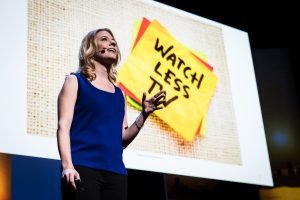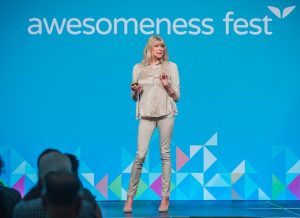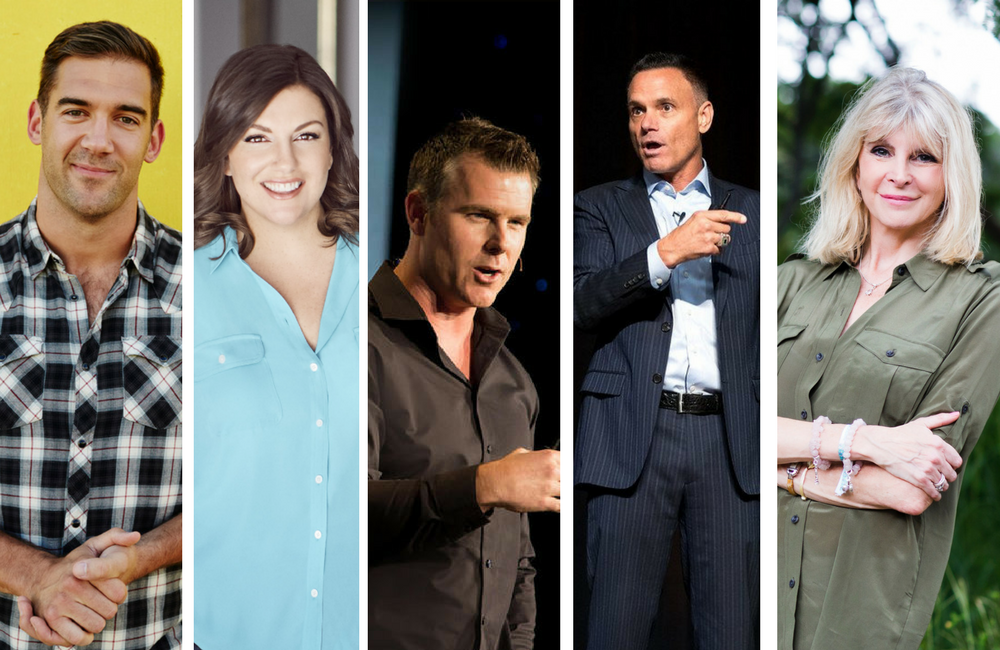Do you want to be the most productive version of yourself?
…But can it sometimes feel like there’s something blocking you from achieving a higher level of performance?
I can relate. The struggle with procrastination, distractions, and lack of focus is REAL. It can be tremendously overwhelming!
After interviewing over 25 of the world’s most productive people, my husband and I learned a thing or two about why some people flounder when others thrive. And it turns out, there are some secrets out there that allow superstars like Oprah and Richard Branson to be prolific by day and larger than life by night.
Below are 10 things these top performers do differently to be incredibly effective in their day.
“Just ten?” you ask?
You’re right – there’s WAY more than ten.
If you want MORE than these ten, we’ve got ‘em. In fact we asked 25 superstars to speak at our 3-day Virtual Productivity Accelerator to capture their secrets on better mindsets, workflow, and freedom. We interviewed Lewis Howes, Kevin Harrington, Natalie Sisson, Dan Martell, Mel Robbins, Influencive’s own Clinton Senkow and 20 other incredible talents to bring their knowledge to you for free this week only.
These speakers are among the most productive people in the world, and include bestselling authors, multi-millionaires, thought leaders, social influencers, media commentators, TED speakers, and serial entrepreneurs.
Grab your FREE ticket to the Lifehack Summit (July 10-12) at this link. Just click here to register with your name and email.
Got your ticket? Great! We can’t wait to see you online!
Okay, now back to the 10 incredible insights we’re sharing with you today.
1. Stop managing your time. Manage your energy and attention instead
It used to be that time was all we had to manage. In the Industrial Age, it was simple to tell how productive we were because productivity was measured in widgets per hour. Today, this formula no longer makes sense for most jobs.
Distractions inundate our homes and offices, on average 20 times per hour. Knowledge workers are expected to manage competing priorities, a full home life, and a demanding social environment. As Chris Bailey, the author of The Productivity Project says, “The state of our attention determines the state of our life.” It’s no longer about how many tasks we cross off our list in an hour, it’s about managing our attention and energy so that we don’t burn out.
Learn more in these Lifehack Summit Interviews: Chris Bailey, Cal Newport, Laura Vanderkam

2. Prioritize ruthlessly – because if you don’t, someone else will
Productivity pros aren’t concerned with getting everything on their plate done. Instead, they’re concerned about what they’re saying “yes” to, and what they’re saying “no” to. Their to-do lists are cleared of any unnecessary, inconsequential, or unimportant tasks in service of their true priorities.
“Ask yourself: Is this a HELL YES or a HELL NO?” – Jules Schroeder, Forbes 30 Under 30 podcast host
Instead of letting the tides of life take you where they will, grab the reins and define your #1 priority for your week, month and year. It’s easy to blame our circumstances or resources for our lack of forward movement towards our goals, but this isn’t the attitude of a true productivity master.
After all, as bestselling author Jay Papasan says, “You can use money to buy future time, but there’s no amount of money that can buy time you mis-spent in the past.”
Learn more in these Lifehack Summit Interviews: Jay Papasan, Dan Martell, Greg McKeown
3. “Deep Work” is a superpower in the 21st century
“Deep Work” is defined by author Cal Newport as cognitively demanding tasks performed in a state of distraction-free concentration. These efforts create new value, improve your skills, and are hard to replicate. In other words, they are not the “shallow” tasks we tend to do much of our day!
“Shallow work is what stops your startup from going bankrupt, deep work is what grows it 10x.” – Cal Newport
Newport argues that focus is the new I.Q. in the digital age of distraction, and that almost no individuals are actually focusing on developing…well, focus. For knowledge workers, he proposes that [High-quality work produced = (time spent) x (intensity of focus)]. In other words, it’s not just about putting in the hours. It’s about developing focus as a muscle.
Learn more in these Lifehack Summit Interviews: Cal Newport, Jairek Robbins
4. Mindsets are the groundwork for productivity
We expected the most productive people to have some secret techniques not apparent to the naked eye. You know, the kind of secrets that make them appear impervious to life’s difficulties and endlessly productive…and make the rest of us jealous.
It turns out these secrets are mindsets.

Caitlin Pyle, successful entrepreneur behind Proofread Anywhere, says, “Mindsets are the groundwork for the reality we create for ourselves.” Top performers anticipate and circumvent mental roadblocks when they’re experiencing analysis paralysis or other productivity malaise. They use meditation, mindfulness, and even common self-awareness to keep their mindsets focused and positive.
Natalie Sisson, founder of the 7-figure company The Suitcase Entrepreneur, is closely in tune with her mindsets. In fact she recently took an extended sabbatical to realign herself with her work. She suggests asking “What am I doing right now that’s not serving me?” as a simple way to identify areas that cause your growth to stagnate.
Learn more in these Lifehack Summit Interviews: Caitlin Pyle, Natalie Sisson, Marisa Peer, Jessica Geist
5. Start your day off right with a “Night Before” Routine
Morning routines are in vogue amongst those hopeful for a daily formula for peak success. But the most productive people know that the secret to getting out of bed on the right side lies in the night before.
Creating a “night before” routine means setting yourself up for success the following day, by reviewing your schedule, setting your priorities, and adjusting for new realities. Erik Fisher, host of the productivity podcast Beyond The To-Do List, calls this “passing the baton to my future self.” Like a general preparing for battle, creating a “night before” routine gets you on offense before your day forces you onto defense.
Learn more in these Lifehack Summit Interviews: Erik Fisher, Todd Henry
6. Batch similar tasks together to optimize your creative flow
Grouping tasks of similar cognitive difficulty and skill is a simple way to make work feel easy. By clustering similar tasks in your day (for example, making phone calls only from 2-4pm instead of spread throughout the day) you’re able to stay in uninterrupted flow longer. This makes it simpler for your brain to process information and solve problems, instead of constantly jumping between unrelated tasks.

Learn more in these Lifehack Summit Interviews: Dan Martell, Erik Fisher
7. “Trick” your brain into optimal performance
Our brains are designed to protect us from doing things that could cause us pain. But this backfires when we’re trying to get to the next level of life. Because while status quo is comfortable, to reach the next level requires us to step WAY outside our comfort zones!
The good news is that modern psychologists, therapists, and thought leaders suggest many ways to trick our evolutionary mechanisms to keep our brains from holding us back. As Mel Robbins says, “You can out-trick your brain in furtherance of higher goals.” Her simple 5 Second Rule collapses a litany of psychological principles and by-passes our built-in processes that keep us in the mode of inaction, procrastination, and avoidance.
Learn more in these Lifehack Summit Interviews: Mel Robbins, Rick Hanson
8. Seek out discomfort on a daily basis
The most productive, successful people actively seek out a feeling of discomfort every day. Lewis Howes describes applying this principle to everything he does – from his intense workouts, to his award-winning podcast, to writing his next bestseller. If it doesn’t feel slightly outside his comfort zone, then he knows he isn’t pushing himself hard enough. As he puts it, “the only way for us to grow is to constantly step into things we’ve never done.”
“The only way for us to grow is to constantly step into things we’ve never done.” – Lewis Howes
Charlie Hoehn, the TEDx speaker and marketing guru behind many bestselling books, describes how he does improv comedy to “become better at failing” and continually push himself out of his comfort zone. Being better at dealing with failure makes him more confident and willing to make bold leaps forward.
Learn more in these Lifehack Summit Interviews: Lewis Howes, Charlie Hoehn
9. Defend your creative time viciously
Time has an odd way of disappearing – fast! The most productive people actively find ways to defend big blocks of time where they can really dive into creative work. Amy Porterfield, the online marketing guru, blocks her “Tiger Time” on her calendar. She’s so committed to this time that she’ll fight for it no matter what distractions are thrown at her – including a party happening right downstairs.
Other prolific writers and content producers are adamant about defending their mornings. Todd Henry, the author of 3 (soon to be 4) books on unleashing your potential, is of this opinion. When he doesn’t want to start writing, or is procrastinating on that next podcast, he reminds himself that he wants to “die empty” – in other words, he doesn’t want to take his best work with him to the grave.
“Get your best work out of you so you don’t take your best work with you to the grave.” – Todd Henry
Learn more in these Lifehack Summit Interviews: Amy Porterfield, Todd Henry, Kevin Harrington
10. Play the long game when it comes to relationships
Clinton Senkow, the co-founder and COO of Influencive, attributes much of his success to the network he’s developed over the years. In the short term, taking the time to provide value to someone else and network with them can seem pointless. “But it’s a long-term play,” he says, “because in the long term it will catapult you forward.”
This secret seems particularly crucial today as the Relationship Economy rears its head. As we struggle to find our place in an increasingly global world, the relationships we grow and maintain are what differentiate us from the pack. In fact, leading performance coach Jairek Robbins goes so far as to say that “33% of the people in your peer group should be 5 steps ahead of you.”
“33% of the people in your peer group should be 5 steps ahead of you.” – Jairek Robbins
Learn more in these Lifehack Summit Interviews: Clinton Senkow, Jairek Robbins
We’re just scratching the surface of the incredible insights we learned from these rockstars, so now’s the time to register for the Lifehack Summit.
This is going to be the most enjoyable kick in the pants you’ve ever gotten – so don’t miss your chance to join us online for free! Grab your ticket here.
This is a Contributor Post. Opinions expressed here are opinions of the Contributor. Influencive does not endorse or review brands mentioned; does not and cannot investigate relationships with brands, products, and people mentioned and is up to the Contributor to disclose. Contributors, amongst other accounts and articles may be professional fee-based.

